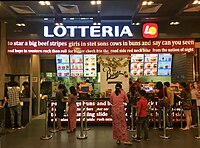This article has multiple issues. Please help improve it or discuss these issues on the talk page. (Learn how and when to remove these messages)
|

Engrish is a slang term for the inaccurate, poorly translated, nonsensical or ungrammatical use of the English language by native speakers of other languages. The word itself relates to Japanese speakers' tendency to struggle to pronounce the English /l/ and /r/ distinctly arising from the fact Japanese has only one liquid phoneme (usually romanized r), but its definition encompasses many more errors. Terms such as Japanglish, Japlish, Jinglish, or Janglish are more specific to Japanese Engrish. The related Japanese term wasei-eigo (和製英語: 'Japanese-made English') refers to pseudo-anglicisms that have entered everyday Japanese.
The term Engrish first appears in the 1940s (suggestive of a mispronunciation of English) but it was not until the 1980s that it began to be used as a byname for defective Asian English. While the term may refer to spoken English, it often describes written English. In Japan, it is common to add English text to items for decorative and fashion purposes (see cool). Such text is often added to create a cosmopolitan feeling rather than to be read by native English speakers, and so may often be meaningless or grammatically incorrect. Engrish can be found in many places, including signs, menus, and advertisements. The words are frequently humorous to speakers of English.
Japanese Engrish / Japanglish
Japanese and English have significantly different grammar: Japanese word order, the frequent omission of subjects in Japanese, the absence of articles, a near-complete absence of consonant clusters, and difficulties in distinguishing /l/ and /r/, or /θ/ and /s/ sounds, all contribute to substantial problems using Standard English effectively. Japanese people have tended to score comparatively poorly on international tests of English.
Further, English is frequently used in Japan (and elsewhere) for aesthetic rather than functional purposes; i.e., for Japanese consumption, not for English speakers per se, as a way of appearing "smart, sophisticated and modern", in much the same way as Japanese and similar writing scripts are used in Western fashion. Such decorative English is not meant to be read and understood by native English speakers, so emphasis is not placed on coherence or accuracy.
The Japanese language also makes extensive use of loanwords, especially from English in recent decades, and these words are transliterated into a Japanese form of pronunciation using the katakana syllabary. Japanese speakers may thus only be familiar with the Japanese pronunciation or Japanese meaning, rather than its original pronunciation or meaning. This is particularly the case when the source English word contains sounds or sound clusters which have no equivalent in katakana.
Examples include:
- "Modan gāru" vs "Modern girl"
- For a more recent example: Sega's Mega Drive is spelled in katakana as メガドライブ, hence it is pronounced as Mega Doraibu; the console was renamed for the American market as Sega Genesis.
- The jazz fusion band Casiopea (est. 1976) has its name based on "Cassiopeia": neither the double s nor the three-vowel -eia would fit the katakana format.
In popular culture
Engrish has been featured occasionally in South Park, an American animated TV show by Trey Parker and Matt Stone. One example is the song "Let's Fighting Love", used in the episode "Good Times with Weapons", which parodies the poorly translated opening theme sequences sometimes shown in anime. Parker and Stone's feature-length film Team America: World Police (2004) also features Engrish when the North Korean leader Kim Jong-il is depicted singing the song "I'm so Ronery".
Monty Python's Flying Circus featured a parody of the drama series Elizabeth R, where they portrayed the cast riding motor-scooters and speaking Engrish, thus changing the title to "Erizabeth L".
In the 1983 film A Christmas Story, the Parker family goes to a Chinese restaurant for their Christmas dinner, and are serenaded by the waitstaff with Engrish Christmas carols, such as "Deck the harrs wis boughs of horry, fa ra ra ra ra ra ra ra ra" and "Jingre berrs, jingre berrs, jingre arr the way, oh what fun it is to ride in one-horse open sreigh!"
The British fashion brand Superdry, which takes inspiration from Japanese clothing styles, has established a style of placing meaningless Japanese text such as 'Sunglasses company' and 'membership certificate' on clothing sold in Britain. The company explained to a Japanese television news programme that most translations were done using simple automatic translation programs such as Babel Fish, without attempting to make the texts accurate.
Gallery
- Examples of Engrish from around the world
-
 Lotteria restaurant in Myanmar. A poem that appears as part of the decor at other Lotteria locations has been rearranged into semi-nonsensical Engrish.
Lotteria restaurant in Myanmar. A poem that appears as part of the decor at other Lotteria locations has been rearranged into semi-nonsensical Engrish.
-
 Engrish on a Toyota RAV4, used solely for aesthetic and marketing purposes, the Bahamas
Engrish on a Toyota RAV4, used solely for aesthetic and marketing purposes, the Bahamas
-
 A poorly translated sign warns visitors of stray dogs at the beach in Kenting National Park, Taiwan.
A poorly translated sign warns visitors of stray dogs at the beach in Kenting National Park, Taiwan.
-
 Engrish behind a bar in Thailand
Engrish behind a bar in Thailand
-
 A sign in a shop in Thailand
A sign in a shop in Thailand
-
 Engrish on a sign in a winery near Iwamizawa, Japan
Engrish on a sign in a winery near Iwamizawa, Japan
-
 Numerous examples on a menu from a restaurant in Sapporo, Japan
Numerous examples on a menu from a restaurant in Sapporo, Japan
-
 Guest information in a hotel in Naka-Furano, Japan
Guest information in a hotel in Naka-Furano, Japan
-
 Examples on a product on sale at a Daiso in Japan
Examples on a product on sale at a Daiso in Japan
-
 Engrish on a sign outside a ramen restaurant in Sapporo. Note the proper grammar, yet somewhat odd phrasing.
Engrish on a sign outside a ramen restaurant in Sapporo. Note the proper grammar, yet somewhat odd phrasing.
-
 A bad translation on a product on sale in Japan
A bad translation on a product on sale in Japan
-
 A typically nonsensical translation from Japanese to English on a T-shirt on sale in Japan
A typically nonsensical translation from Japanese to English on a T-shirt on sale in Japan
-
 A nonsensical translation on a foot pressure scanner in a shoe store in Japan
A nonsensical translation on a foot pressure scanner in a shoe store in Japan
-
 Obstreperous (a misspelling of octopus) on a food stall sign in Thailand
Obstreperous (a misspelling of octopus) on a food stall sign in Thailand
-
 A mistranslated sign in a cafeteria in Thailand
A mistranslated sign in a cafeteria in Thailand
-
 A flat tyre repair kit from Daiso
A flat tyre repair kit from Daiso
See also
- "All your base are belong to us", an internet meme originating from the opening to the European Mega Drive version from Zero Wing
- Broken English
- Chinglish
- English as She Is Spoke
- "It's dangerous to go alone! Take this!", another internet meme of similar background (from the 1986 video game The Legend of Zelda for the Nintendo Entertainment System (NES)).
- Japanese Pidgin English
- List of lishes
- Danglish, equivalent between English and Danish
- Denglisch, equivalent between English and German
- Dunglish, equivalent between English and Dutch
- Finglish, equivalent between English and Finnish
- Franglais, equivalent between English and French
- Runglish, equivalent between English and Russian
- Spanglish, equivalent between English and Spanish
- Taglish, equivalent between English and Tagalog
- Non-native pronunciations of English
- Perception of English /r/ and /l/ by Japanese speakers
- Portrayal of East Asians in American film and theater
- Wasei-eigo
References
- Ziemba, Christine N. (December 5, 2004). "Translate at your own risk". Los Angeles Times. Retrieved 13 June 2013.
- ^ Lambert, James (2018). "A multitude of 'lishes': The nomenclature of hybridity". English World-Wide. 39 (1): 12. doi:10.1075/eww.00001.lam.
- Dougill, John (2008). "Japan and English as an alien language" (PDF). English Today. 24 (1): 18–22. doi:10.1017/S0266078408000059. S2CID 145471291. Archived from the original (PDF) on 2016-03-17. Retrieved 2013-05-21.
- Kowner, Rotem (2003). "Japanese Miscommunication with Foreigners: In Search for Valid Accounts and Effective Remedies" (PDF). Jahrbuch des Deutschen Instituts für Japanstudien. 15: 117–151. Archived from the original (PDF) on 2014-08-01.
- Ikeshima, Jayne Hildebrand (July 2005). "Some perspectives on the phenomenon of "Engrish"" (PDF). Keio Journal of International Studies. 15: 185–198. Archived (PDF) from the original on 2011-07-22.
- Dougill, John (1987). "English as a decorative language". English Today. 3 (4): 33–35. doi:10.1017/S0266078400003126. S2CID 145079203.
- Melin, Tracy; Rey, Nina (2005). "Emphasizing Foreign Language Use to International Marketing Students: A Situational Exercise That Mimics Real-World Challenges". Global Business Languages. 10: 13–25.
there is often no attempt to try to get it right, nor do the vast majority of the Japanese population ever attempt to read the English design element in question. There is therefore less emphasis on spelling and grammatical accuracy.
- Stuever, Hank (October 15, 2004). "Puppet Government 'South Park' Creators' Left Jab at Jingoism May Backfire". The Washington Post. Archived from the original on 2019-05-06. Retrieved 16 September 2011.
The North Korean dictator speaks in the voice of 'South Park's' Eric Cartman, ... only with an Engrish accent. 'I'm so ronery,' Kim confesses in a pitiful ballad to himself, which explains his evil-doing—he just needs to be ruvved.
- Monty Python's Flying Circus, Series 3 Episode 3 of 13, Features The Money Programme, Erizabeth L, Dead Bishop, Jungle Restaurant and The Argument Skit, 2 November 1972
- "Superdry". Unmissable Japan. Retrieved 2 October 2014.
- "Superdry: Popular UK Fashion Brand Uses Gibberish Japanese". Japan Probe. Archived from the original on 6 October 2014. Retrieved 1 October 2014.
External links
- Engrish.com Examples of Engrish from Japan, China and elsewhere
- fahruz.org (2003–2007) Collection of Engrish and equivalents in French, German and Italian (archived on Wayback Machine March 3, 2016)
- Large Engrish photo collection on Weird Asia News
- EngrishCheck Instagram Photos of Engrish from Japan
- Translation Party Online tool demonstrating how phrases are lost in translation between English and Japanese
| Interlanguages | |
|---|---|
| Multiple languages |
|
| English |
|
| Arabic |
|
| Chinese |
|
| Dutch | |
| French |
|
| French Sign Language |
|
| German |
|
| Greek |
|
| Hebrew |
|
| Italian |
|
| Japanese |
|
| Malay |
|
| Portuguese |
|
| Russian |
|
| Scandinavian languages |
|
| Spanish |
|
| Tahitian | |
| Tagalog | |
| Turkish |
|
| Ukrainian |
|
| Yiddish |
|
| Dialects and accents of Modern English by continent | |||||||||||||||||||
|---|---|---|---|---|---|---|---|---|---|---|---|---|---|---|---|---|---|---|---|
| Europe |
| ||||||||||||||||||
| Americas |
| ||||||||||||||||||
| Oceania |
| ||||||||||||||||||
| Africa | |||||||||||||||||||
| Asia |
| ||||||||||||||||||
| Related |
| ||||||||||||||||||